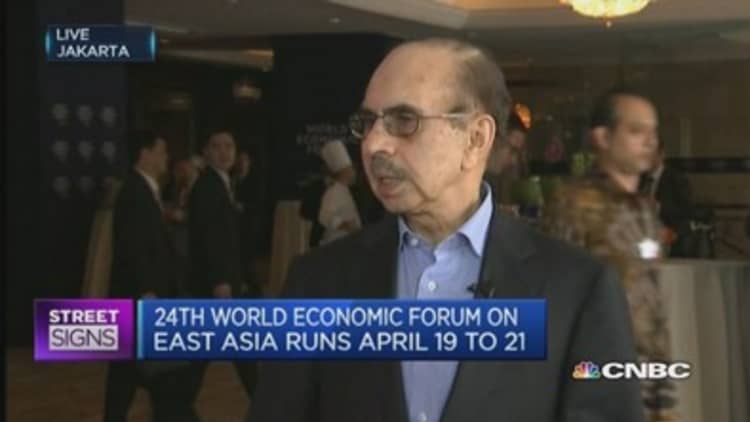Indian equities appear to be losing their mojo since hitting a lifetime high in March, as weak corporate earnings, soft growth momentum and uncertainty over the government's tax policy discourages investors.
The S&P BSE Sensex has fallen almost 8 percent since March 4, when the benchmark index touched an all-time peak of 30,024.74. Year-to-date, the gauge is up just 1 percent, trailing regional peers such as the Shanghai Composite, which is up 36 percent.
With a number of challenges hanging over the market, it's likely to move sideways in the months ahead unless positive catalysts emerge, say strategists.
"There are a number of reasons to explain the reversal of fortunes. For a start, confidence over the government's reform agenda may be waning a little. In particular, the Finance Ministry's plan to retrospectively tax both foreign and domestic companies is likely to have unnerved investors," Shilan Shah, India economist at Capital Economics, wrote in a note.
"Looking ahead, with valuations still looking stretched and uncertainty over the government's tax policy, a spectacular rebound in the equity market seems unlikely," said Shah, who expects the Sensex to end the year at 30,000.
Potential catalysts
According to Simon Grose-Hodge, head of South Asia investment strategy at LGT Group, an interest ratecut could help inject fresh life into the market.
"Some people are disappointed that the Reserve Bank of India (RBI) hasn't been more aggressive with cutting interest rates," he said. "I think we'll get at least one more cut, which will be beneficial for the stock market."
At its last meeting on April 7, the RBI kept rates on hold at 7.5 percent, saying that it would wait longer to assess inflationary pressures before making its next move.
Read MoreIndia's IPO market is heating up: BSE Head
Nevertheless, Grose-Hodge believes the pullback in the market is temporary and presents a buying opportunity.
"There's a fair amount of reform going on, and the foreign direct investment (FDI) channel looks encouraging. As for corporate earnings, I think the pessimism is unwarranted, profitability seems to be underestimated," he said.
"As a medium-to-long term investor, there's still a lot of value. We're advising clients to buy into the weakness," he added.
Land Acquisition Bill
Jigar Shah, CEO of Maybank Kimeng Securities India said another potentialmarket stimulant would be the passage of the controversial Land Acquisition Bill.
Opponents of the bill argue it will hurt the interests of farmers, while the government says it's required for economic development.
During the first leg of its budget session, which ended on March 20, the government won parliamentary approval for three key bills crucial to its reform agenda: the Mines and Minerals Bill, the Coal Mines Bill and the Insurance Bill.
However, it was unable to pass the Land Acquisition Bill through the upper house and had to re-introduce the ordinance in early April.

Investors are waiting to see if the bill to make it easier to acquire land will be passed during the second leg of the budget session from 20 April to 8 May 2015.
"If they can pull through on the Land Acquisition Bill it will provide a catalyst for the market," said Shah.
Aside from reforms, further evidence of a turnaround in the economy will help the stock market, he said.
"The recovery is still elusive, I think in another 6-9 months we'll see some stronger evidence on the ground to suggest the Indian economy is performing to potential."


